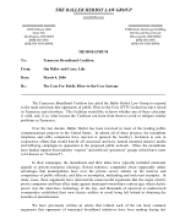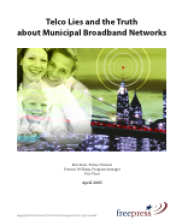By
From the Executive Summary (stats from 2005): The attention of policymakers in both parties is now focused on the question of how to promote competitive broadband markets that will deliver high-speed Internet access to all Americans at affordable rates. It is a difficult problem. Present estimates are that around 30% of US households subscribe to DSL or cable modem service. This compares to over 70% in countries like South Korea. Virtually every rural state remains underserved and uncompetitive. In urban areas, many families are priced out of the market. The telecom and cable kings of the broadband industry have failed to bridge the digital divide and opted to serve the most lucrative markets at the expense of universal, affordable access. As a result, local governments and community groups across the country have started building their own broadband networks, sometimes in a purely public service and more often through public-private partnerships. The incumbents have responded with an aggressive lobbying and misinformation campaign. Advocates of cable and DSL providers have been activated in several state capitols to push new laws prohibiting or severely restricting municipalities from serving their communities. Earlier this year, Verizon circulated a “fact sheet” to lawmakers, journalists and opinion leaders proclaiming the so-called “failures” of public broadband. Many of the statistics come from a widely discredited study of municipal cable TV networks published in 1998. This paper debunks these lies case by case, juxtaposing information direct from the city networks with quotations from the telco propaganda. The results are unequivocal and damning.



